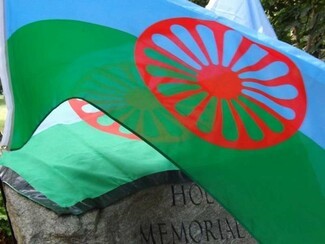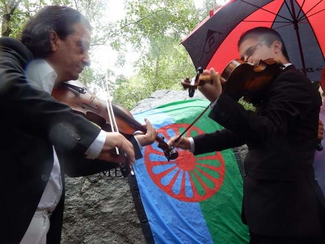Remembering Zigeunernacht - The Night of the Gypsies; August 2nd, 1944

Lizzie Isaacs writes about why we should remember August 2nd, 1944, when the Romani camp in Auschwitz was ‘liquidated’ by the SS guards, despite the courageous resistance to the very end from the men, women and children who were incarcerated there by the Nazis.
As we stand or should be standing, to remember the night when the Romani camp at Auschwitz was liquidated, we should also think about our reasons for doing so. If you think about the Holocaust as a historical event that happened in Europe with no connection to us in England then sadly you have missed the point. Yes, we all lament what happened to our people, we all grieve for our European cousins who suffered but it wasn’t just about them, it was about us all. The reason all Romanies need to learn about and understand what happened is because if we don’t know what happened how can we expect the Gorja to acknowledge or remember it.
After “The night of the resistance”, on May 16th 1944, the night the Romanies fought back against the original plan to empty the camp, the SS set about lulling them into a false sense of security. They spent the following two months telling the Romanies that they were Aryans and therefore safe, nothing bad was going to happen to them. However, a very cruel and callous plan was being hatched by those in charge of the camp at Auschwitz. Because of what happened on the 16th May that year the SS guards were actually afraid of an uprising and if any one group came close to causing that uprising it was the Roma and Sinti occupants. So, on the morning of the 2nd of August all the men and boys in the Zigeunerlager were rounded up, put on trains and sent to other camps, where the majority of them would later die. That night, with the strongest out of the way, the women, children and the sick were rounded up and sent to the gas chambers. Now, anyone who has been to Auschwitz will know that the Zigeunerlager was situated quite close to the train track and the gas chambers. It is said that the majority of people who came into the camp were sent straight to their death, they were told they going to have a shower, they were stripped naked, men, women and children together, and told to walk into what they thought was a shower room. It was only when the showers flowed with gas that they knew they were going to die.

This was true mainly for the Jews, however the Romanies knew what was happening because they had been kept in the camp for months as forced labour. Each day from their barracks they saw the trains come in and the people sent to gas chambers, they knew exactly what their fate was. You see, the plan for the Romanies was different to the one for the Jews, the gas chambers were built for the Jews originally. The plan for the Romanies was that they would die out of natural causes, starting with the sterilisation program. If you couldn’t have children the race would die out, right?
Most Roma and sinti did die of causes other than being gassed to death. They died of starvation, brutal treatment, inhumane living conditions and many were rounded up from their camps and shot on the spot, not counted, just recorded as “a number of Gypsies”. In Auschwitz the Romanies were given their own family camp, they weren’t split up like the Jews, families could stay together. Now this wasn’t to be kinder to them, it was because the guards knew that if you tried to take the Romani children away from the parents they would go mad, so it was done to keep control. In the camp, they lived in awful conditions. The barracks were made to hold 200 people but three or four times the amount were squashed in, whole families had to share a small bunk. If you weren’t killed on arrival, you could last up to three months in the camp before dying.
The Zigeunerlager (the Gypsy camp) had its own Dr, Joseph Mengele was assigned to work there. He would carry out horrific experiments on the Romanies while he was there, seemingly just for the thrill of it. Often the experiments killed the person, if not they were murdered anyway so Dr Joseph could dissect the bodies.
For some reason it was decided the Romanies had served their purpose and could be eliminated and on the 2nd of August that plan came to fruition. With the weakest left in the camp it seemed easy to round them up and take them to the gas chamber; however, it was not as simple as that. Witness accounts say that the Romanies fought to the very end. There are stories from other inmates that say they could hear screams coming from the Romanies and the guards, everyone in Auschwitz knew they were fighting till their last breath. Rudolf Hoss, the commandant of Auschwitz, in his memoirs wrote of the night, and what he said is very telling. “It was not easy to lead them into the gas chambers, I was not there but Schwarzhuber told me, no liquidation of Jews had ever been so difficult”. That night over 3000 Roma and Sinti were murdered and the bodies burnt in the pits. The Zigeunerlager was empty. All in all over 21,000 Romanies died in Auschwitz. Although the official number killed in the Holocaust stands at 500,000 this is a very conservative estimate; it is likely that up to 2 million died across 12 different countries. In some of those countries the Romani population was almost wiped out completely. The Romani population lost a bigger percentage than any other group including the Jews.

Why is it important to know this now? We, all of us need to know and never forget what happened that night or any night during the Holocaust, we also need to tell other people. Not just so we can show our respect for those that perished but so that, by doing so we help stop such atrocities happening again. The Holocaust wasn’t just about Europe, it wasn’t just about the Roma and the Sinti, it was about every single one of us. Every single Gypsy in the world today is a survivor of the Holocaust because we were all part of the plan. Even though Hitler didn’t get to Britain, we know he had set up a government department collecting information on all Romanies in Great Britain, there were lists in Berlin containing names and locations of British Romanies ready for the when the invasion took place. If the Allies didn’t win the war, then none of us would be here now, our fate was planned to be the same as our European counterparts. We must not or ever be complacent about that. Evil presents itself in many different ways and we need to know what it looks like so we will recognise it when it comes again. And it will come again.
I can’t share stories like the Europeans; I don’t have the horrific images of my loved ones etched in my memory. I didn’t know personally anyone who survived the camps or had my family taken away from me but I do share the grief and I do share the burden. I also share the fear when I see the signs today of the extreme hatred that still exists in the world towards us. The registration of Roma in Italy, the attacks on the camps in Ukraine, even the way the British government has thought of a way to eliminate us by telling us we don’t exist anymore. Every day I see a new report, a new video of atrocities happening to our people around the world. Here in England we have faced our own oppression, the quiet, unreported, subtle but constant grinding away at us. After 500 years we might be different than we were when we first entered the country, we might have lost some of our language but the fact that we are still here is remarkable in itself. I don’t have all the answers, for years I have worked to change the opinion of people towards us, with it seems little satisfaction, yet I continue to do it in the hope that one day they will see all the good things about our culture that we see. So when we remember the 3000 that died in the gas chambers of 2nd of August we should also remember their courage and spirit, they didn’t give in or give up till the very last, they were our people and we need to have that same courage and same spirit about us. We need to stand united with our cousins in Europe, and they with us, nobody has to stand alone. We are one people, Roma, Sinti, Manouche, Kale and Romanichal and every single Romani around the world, we need to show support to one another. We need to show the world we are not people who will sit back and do nothing. And show them too, that we will never be led to the gas chambers again.
By Lizzie Isaacs